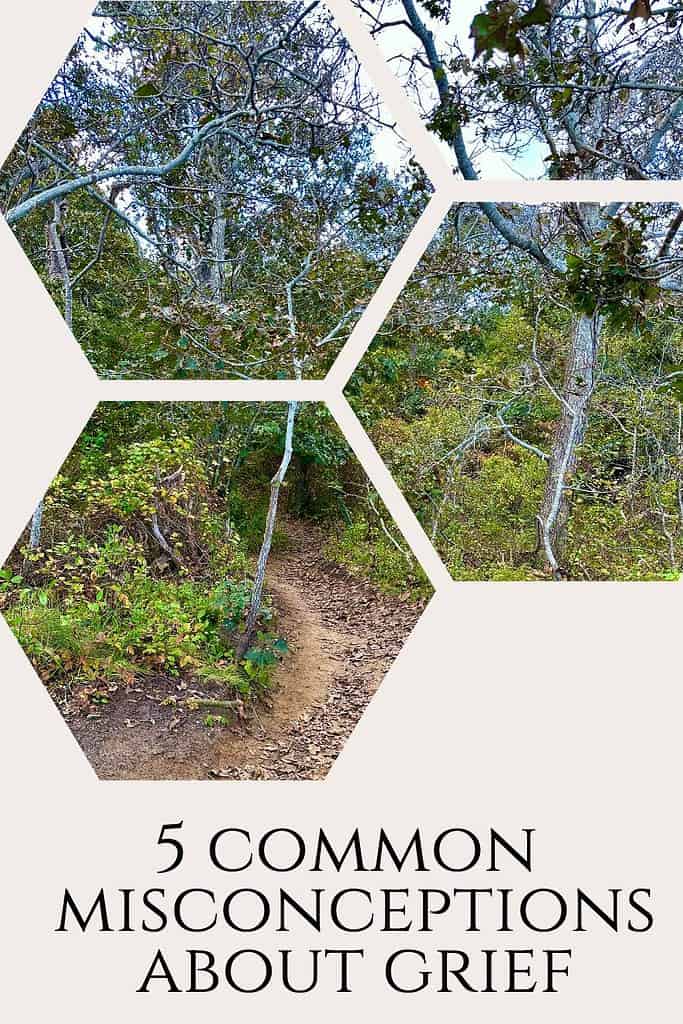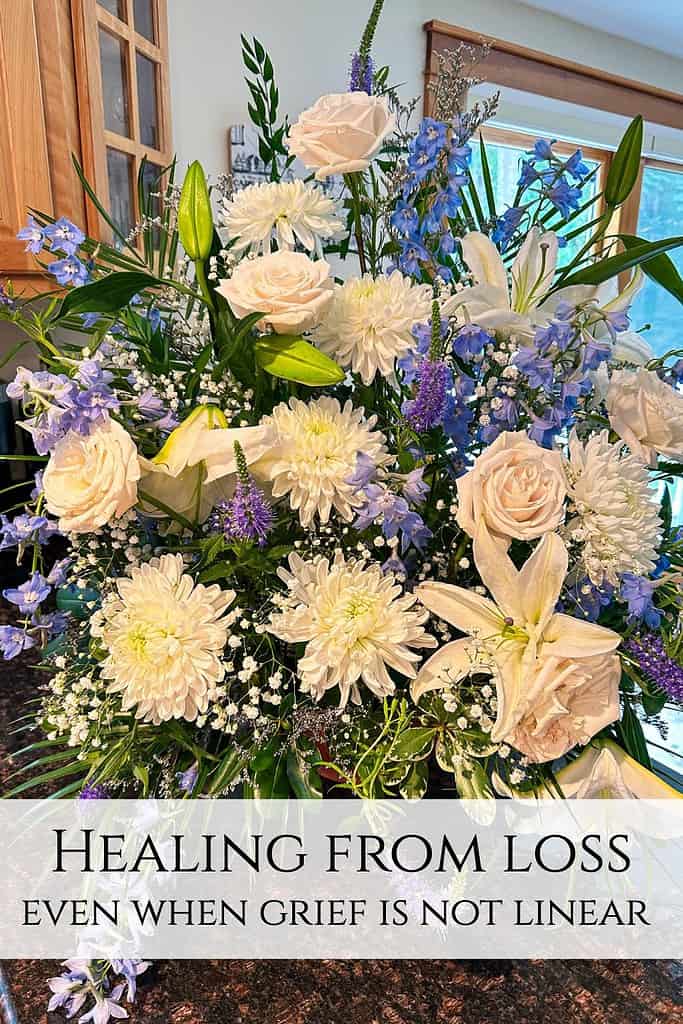Healing From Loss Even When Grief Is Not Linear
Grief is an inevitable part of life. The key is learning to navigate the grieving process for personal growth and healing, even when grief is not linear. The truth is, we can in fact heal from loss, and explore strategies for resilience, even in the face of heartache.

Even though grief is not linear, it can be a healing process back to wholeness. There are many different ways to grieve, and there is no one right way. Grief is as unique as the individuals going through it.
Merriam-Webster defines grief as a “deep and poignant distress caused by or as if by bereavement,” and “a cause of such suffering.”
Grief is not exclusive to the loss of a loved one through death, however. People grieve for many different reasons.
Examples of why people grieve are significant loss such as the death of a loved one, divorce, terminal illness, loss of a friendship, loss of a job, or even the loss of a dream.
This article may contain affiliate links for your convenience, and as an Amazon Associate, I earn from qualifying purchases at no extra cost to you. You can read the full disclosure policy.
5 Common Misconceptions About Grief
Grief is a complex and deeply personal experience. Misconceptions about grief can sometimes slow down, or even stunt, the grief process.
Here are 5 common misconceptions about grief:
- Grief Has a Timeline – it is a common misconception that grief has a predictable linear timeline. There are no time limits and in reality, there is no set timeline for grieving. Everyone is different, and people will grieve at their own pace.
- Grief Follows Stages – the idea that grief follows different stages was popularized by psychiatrist Elisabeth Kubler-Ross and her five stages of grief theory, also known as the Kubler-Ross model. Over the years, the Kubler-Ross theory has been oversimplified, even to Dr. Kubler-Ross’ dismay. Grief is not a linear process, and individuals may move back and forth between these stages, or experience them differently.
- Grief Is the Same for Everyone – the experience of grief is different for everybody, and there is no wrong way to grieve. You may experience good days, bad days, and everything in between.
- Grief Should Be Kept Private – some people believe grief should not be discussed openly but rather be done in private. Having someone to talk to, a trusted friend or family member can be a wonderful source of support, and helpful for healing. Suppressing grief and stifling emotions could lead to emotional and psychological issues down the road.
- Time Heals All Wounds – time alone does not necessarily alleviate grief but how one processes emotions, as time passes, is the most important thing. A hole of grief, without proper support or intervention, can plague one for a very long time.

Understanding Why Grief Is Not Linear
Grief is non-linear because it does not follow a straightforward or predictable path. It does not progress from one stage of grief to the next in a linear fashion.
Everyone is unique in how they process grief, even if given a similar experience. Grief will take on different forms based on personalities, background, coping mechanisms, and more.
Grief can feel like an emotional rollercoaster with ever-changing and conflicting emotions. In one moment, an individual may feel a sense of acceptance and peace, and then the next moment a sudden wave of anguish and sorrow. The best thing is to be kind to yourself and honor every single feeling.
Grief can be reactivated by certain triggers such as birthdays, holidays, and anniversaries. Although this is perfectly normal, it can sometimes feel as though progress has regressed with one step forward and two steps back.
My Personal Journey With Non-Linear Grief
Within a year, my son’s father and my mother passed away. Death was not new to me. I practiced oncology nursing at one of the most critical care hospitals in the country. I understood death, or I thought I did, at least from a distance. However, it is very different when death touches your own family.
Grieving the loss of my son’s father was complicated. We were divorced for years and living very separate lives. Given the situation, it felt like a triple whammy of grief. I was grieving for my ex-husband with all of those complicated emotions while grieving for my son who was mourning the loss of his father.
It took time to process all of my emotions, and I had good days and bad days. There were moments I would feel okay, and then something would trigger me and I’d feel like I was back at square one again.
Just as the grieving for my son’s father was subsiding, my mother passed away. This was an incredibly painful experience and one that I am still processing and wading through.
No one likes to feel grief but allowing yourself the time and space to mourn and go through all of the emotions you need to go through can be therapeutic, enlightening, and beautiful.
There is an introspection, and what feels like a slowing of time, when one is healing from loss and grief. If we try to rush it, we will not attain its full benefits. It’s okay to sit in the muck and pain of grief. We will survive.
As Steph Catudal wrote in her book Everything All At Once, “In grief, everything we do, is everything we have to do to survive.”
So very true.

Strategies For Healing
Here are some helpful strategies for healing, as we go through the grieving process.
Resilience In The Face Of Heartache
Resilience plays a key role in the process of grieving. It helps us adapt and bounce back from the emotional turmoil of grief.
Resilience helps us develop healthy coping skills and over time find ways to move forward with our lives.
Resilience doesn’t eliminate grief but rather, it empowers us to navigate grief with strength and perseverance.

Personal Growth Through Grief
If we allow it, there can be tremendous personal growth through grief.
Grief can lead an individual to gain a deeper understanding of their own emotions, values, and priorities, which in turn can enhance their capacity for empathy and compassion toward others.
Grief also requires us to let go of the past and come to terms with the fact that the past can never be regained. This does not mean forgetting the love or memories that we have but rather accepting a new reality.
If we want to grow through grief it is important to embrace change and recognize that, although life will continue, it will be different.
Growing through grief is not easy and oftentimes it can be a painful journey. However, if managed in a healthy and constructive way, there also can be wonderful new opportunities and experiences along the way.
Processing Grief: Tools And Techniques
Here are some simple tools and techniques I find helpful when I am trying to process grief.
FREE GUIDE: Helpful Resources For Support
Grief Is Not Linear And That Is Okay
Grief is not linear and that is perfectly okay. It does not follow a predictable path or timeline, and grief is as unique as the individuals who are experiencing it.
Building a strong support system is important when you are healing from grief, as is practicing self-care, seeking professional help if needed, finding meaning and purpose, and coping with triggers.
As you move along the healing journey through grief, please be kind and gentle with yourself. There is no fixed timetable for recovery, and it is absolutely okay to have moments of struggle and pain.
Know that your path is unique and, while the pain of your loss may not completely disappear, over time you can find ways to integrate the loss into your life.
Grief is necessary. If we do not grieve, we did not love. So allow yourself to go through the process of non-linear grief and healing. However long it takes. You are strong enough to navigate the perils of grief with time and self-compassion.
VIDEO: I lost my mom and welcomed my first grandchild within one week
Check out these additional posts on grief and caregiver support
Let’s Connect
If you enjoyed this article, I would love for you to share it with family and friends, or anyone you think might benefit from reading it.
Also, please let me know how you dealt with grief in your own life in the comment section below. I’d love to hear from you.
